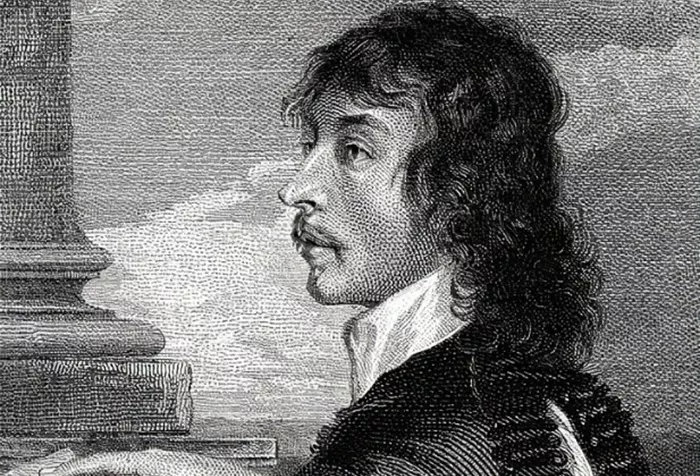Thomas Carew, born in 1595, was a prominent 17th Century British poet. He is best remembered as a leading figure among the Cavalier poets. His poetry reflects the values and aesthetics of his time, blending classical influences with personal elegance. Thomas Carew‘s contribution to British poetry remains significant, though often overshadowed by more famous contemporaries such as John Donne and Ben Jonson.
Early Life and Background
Thomas Carew was born into an affluent family. His father was Sir Matthew Carew, a barrister and Master in Chancery. Thomas studied at Merton College, Oxford. However, his university career was undistinguished, and he left without obtaining a degree. Later, he studied law at the Middle Temple but did not pursue a legal career.
Carew’s position in society allowed him to move in aristocratic circles. He served as a courtier to Charles I and was appointed ‘server in ordinary’ to the king. His courtly life provided inspiration and context for his poetry.
Literary Career and Style
As a 17th Century British poet, Carew’s work is deeply rooted in the tradition of British poetry. His verse often celebrates love, beauty, and courtly pleasures. He is considered a Cavalier poet, a group known for their elegant, witty, and polished style. Unlike the metaphysical poets, Carew preferred clarity and grace over intellectual complexity.
Carew’s poetry exhibits classical influences. He admired poets like Horace and Catullus, whose works emphasize balance and refinement. His poetry often echoes these values, focusing on harmonious expression.
Themes in Carew’s Poetry
The main themes in Carew’s poetry are love, beauty, and the fleeting nature of life. His love poems are addressed to real and imagined women, most notably Celia, a recurring muse in his work.
Carew’s poem “A Rapture” is one of his most famous. It is an erotic celebration of physical love, filled with rich imagery. In “To My Mistress in Absence,” he explores the pain of separation. These themes align with the courtly tradition of British poetry.
However, Carew’s work also contains reflective pieces. His elegy for John Donne shows a different side of his talent. In it, he praises Donne’s wit and intellectual depth, even as his own poetry favors simplicity.
Comparison with Contemporary Poets
To understand Carew’s place in British poetry, it is useful to compare him with other 17th Century British poets. John Donne, Ben Jonson, Robert Herrick, and Richard Lovelace are among his contemporaries.
John Donne, often called the father of metaphysical poetry, is known for his complex imagery and philosophical themes. His poetry demands active engagement from readers. Carew admired Donne but followed a different path. Carew’s poetry is more accessible, focusing on immediate pleasures.
Ben Jonson, another leading British poet, influenced Carew. Jonson’s emphasis on classical forms and his role as a literary critic shaped Carew’s approach. Like Jonson, Carew valued form and elegance.
Robert Herrick, a fellow Cavalier poet, shared Carew’s interest in love and beauty. Herrick’s poetry, like Carew’s, celebrates the joys of life. Both poets wrote in the tradition of British poetry that emphasizes carpe diem—seize the day.
Richard Lovelace, another Cavalier poet, also wrote about love and loyalty. His famous poem “To Althea, from Prison” reflects the Cavalier spirit. Carew and Lovelace both used poetry to affirm courtly values.
Carew’s Place in British Poetry
As a 17th Century British poet, Thomas Carew occupies an important but sometimes underappreciated position. His work bridges the gap between the metaphysical poets and the later Restoration poets. He maintained the elegance of Elizabethan poetry while adapting to new tastes.
Carew’s poetry reflects the social and cultural values of his time. His courtly background influenced his themes and style. His poetry was meant to entertain and charm, not to puzzle or provoke.
In the broader context of British poetry, Carew represents the Cavalier ideal. His work exemplifies the wit, grace, and lyrical beauty associated with this group. Though not as philosophically profound as Donne, or as technically brilliant as Jonson, Carew’s poetry has its own appeal.
Influence and Legacy
Thomas Carew’s influence on British poetry can be seen in the work of later poets. His focus on lyrical elegance influenced the development of English lyrical poetry. He set a standard for courtly love poetry that continued into the Restoration.
Carew’s poems were published posthumously in 1640. His collection, “Poems,” was well received. Critics praised his smooth style and graceful expression. Over time, his reputation fluctuated, but modern scholars recognize his contribution to 17th Century British poetry.
Carew’s poetry is often included in anthologies of British poetry. His best poems, like “A Rapture,” “To My Mistress in Absence,” and “An Elegy upon the Death of the Dean of Paul’s” (for Donne), remain popular with readers and scholars.
Conclusion
Thomas Carew, a 17th Century British poet, holds an essential place in the tradition of British poetry. His work reflects the values of the Cavalier poets, emphasizing love, beauty, and lyrical grace. While his contemporaries like Donne and Jonson explored complex philosophical and technical challenges, Carew chose elegance and simplicity.
His poetry remains a testament to the courtly tradition in British poetry. Through comparison with other poets of his time, Carew’s unique voice becomes clear. He is a poet of pleasure and charm, whose works continue to delight readers.
Carew’s legacy as a British poet endures, offering insight into the literary culture of the 17th Century. His contributions remind us that poetry can be both refined and accessible. Though often seen as a minor figure, his influence on the tradition of British poetry is undeniable.
Carew’s life and work reflect a time when poetry was an essential part of courtly life. His poems capture the fleeting joys of love and beauty, providing a window into the values of his era. In doing so, Thomas Carew has secured his place in the rich tapestry of 17th Century British poetry.

